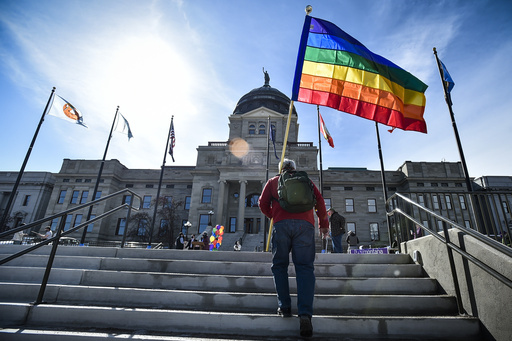HELENA, Mont. — The Montana Supreme Court ruled on Wednesday that a law prohibiting gender-affirming medical services for transgender minors will remain temporarily suspended. All justices came to a unanimous conclusion in agreement with a lower court’s decision, which suggested the legislation is likely to infringe upon the state’s constitutional right to privacy.
The legal challenge against this Montana statute is set to proceed in front of District Court Judge Jason Marks in Missoula.
Phoebe Cross, a 17-year-old transgender boy and the primary plaintiff in the case, expressed his frustrations in a statement, highlighting the struggle he and his peers face. “I will never understand why my representatives are working to strip me of my rights and the rights of other transgender kids,” he stated, emphasizing that the challenges of being a transgender teenager are already significant, and removing rights only exacerbates their struggles.
The attorney general’s office has stated its intention to defend the law, asserting that recent developments in scientific and legal realms support their position. This comes following the British government’s decision the same day to indefinitely prohibit the use of puberty blockers for children experiencing gender dysphoria, citing severe safety concerns.
A spokesperson for the attorney general criticized the temporary blocking of the law, suggesting that it puts the welfare of children who have not yet experienced puberty at risk. “By permitting experimental treatments that could lead to irreversible effects, the Supreme Court is prioritizing flawed legal interpretations over the safety of children,” spokesperson Chase Scheuer said.
In another context, earlier this month, the U.S. Supreme Court reviewed the case regarding Tennessee’s legislation against puberty blockers and surgeries for transgender minors, with reports indicating that the justices appeared inclined to uphold that ban. The Biden administration is also pursuing actions against other similar laws in existence across numerous states.
Kell Olsen, an attorney with Lambda Legal, expressed relief that Montana’s constitutional standards offer stronger protections than their federal equivalents. “Transgender youth in Montana can rest a little easier tonight, knowing they can continue to receive necessary care without immediate threats hanging over them,” Olsen stated.
Republican Senator John Fuller, the bill’s sponsor, criticized the Montana Supreme Court’s ruling, labeling it a severe instance of hyperpartisanship. He objected to the courts allowing what he termed “mutilation and sterilization” of children and emphasized the need to protect minors from what he called unscientific and hazardous medical treatments. Fuller has not yet made a decision on whether to propose a similar measure in the Legislature in 2025.
The legislative discussion surrounding this bill gained notable attention in the spring of 2023 when the Republican majority penalized Democratic representative Zooey Zephyr—the first transgender woman elected to Montana’s Legislature—after she chastised lawmakers backing the bill.
Senator Zephyr remarked on the importance of the ruling, stating that it confirms the well-established view that gender-affirming care saves lives. “Health care decisions should rightly remain between healthcare providers and their patients,” Zephyr asserted.
In late September 2023, Judge Marks temporarily blocked the implementation of the law, validating concerns voiced by transgender youths, their families, and medical professionals that it was likely unconstitutional and detrimental to the health and welfare of minors experiencing gender dysphoria.
Marks characterized the legislative intent behind the law as “disingenuous” and suggested its true aim might be to suppress outcomes deemed undesirable by state lawmakers, rather than genuinely protecting minors.
The law sought to eliminate the ability for transgender minors to access puberty blockers, cross-sex hormones, or surgical interventions for gender dysphoria. However, it was noted that cisgender minors could still receive similar treatments for different medical conditions.
Montana is among at least 26 states that have instituted bans barring gender-affirming care for minors, facing various legal challenges. Some of these laws have encountered temporary suspensions from the judiciary, while others have been implemented. Conversely, fifteen states have established legal protections for gender-affirming medical care for minors.
In the Montana case, arguments from transgender youths stressed that the law would eliminate their access to essential medical care, infringing their constitutional rights related to equal protection, health care access, and dignity. The state Supreme Court upheld the injunction based on the right to privacy, which encompasses the right to make personal medical choices without government intervention.
Some justices contended that the court should clarify that discrimination based on gender identity falls under prohibited sex discrimination as defined by the state constitution’s equal protection clause.
Parents of the plaintiffs argued that the legislation infringes upon their constitutional rights to make medical decisions on behalf of their children, while two healthcare providers mentioned that the law would inhibit them from delivering necessary care.
Gender dysphoria treatments adhere to recognized standards from esteemed medical organizations, including the American Medical Association and the American Academy of Pediatrics, as cited by the ACLU in its lawsuit.
It’s worth noting that one participant in the case was removed from the lawsuit after turning 18 in September 2024.
This story has been corrected to clarify that the U.S. Supreme Court heard arguments concerning the Tennessee measure earlier this month rather than in June.



